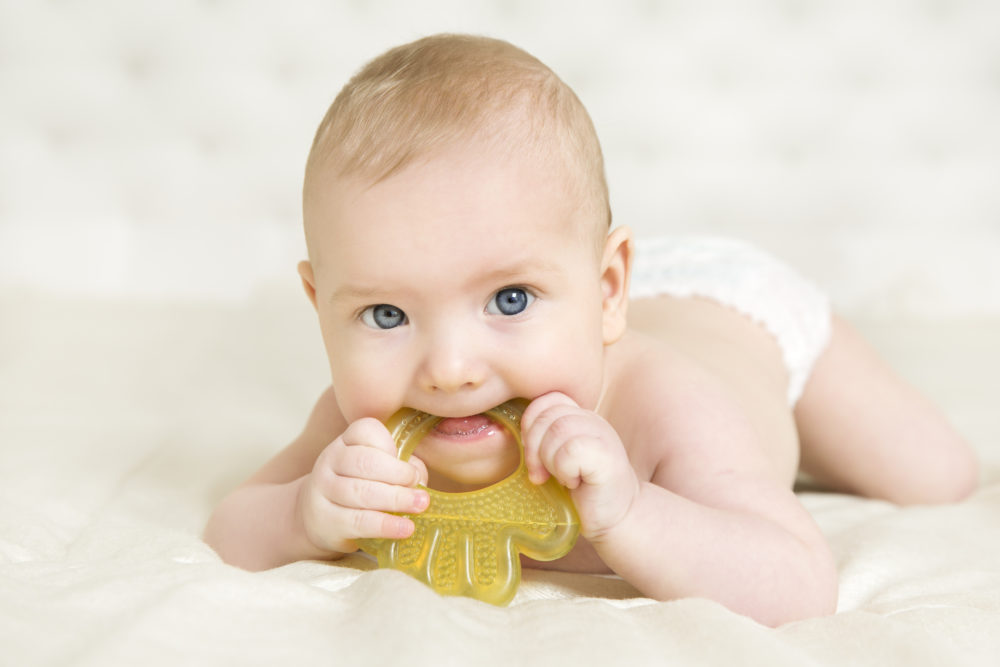
August 16, 2019
Baby Teething Tips
Simple and safe steps can help babies – and parents! – find relief.
If you’re a new parent, we don’t have to tell you that infants can be pretty tough! Often, one of the trickiest parts of your little one’s development can be teething. Teething can really do a number on your baby’s mood and routine, between the pain of teeth pushing through the gums and the added complications that can occur such as ear infections or diarrhea.
To help you navigate this stage, here are some of our dentists’ tips and recommendations for helping your baby get through teething.
Symptoms and timing of baby teething.
Teething normally takes place between 6 months and 3 years of age, as your child’s full set of primary teeth arrive. Eruption of primary teeth can cause some common physical and behavioural issues that can unfortunately make your baby quite uncomfortable at times. It can be difficult, but remember that teething is a normal part of your child’s development, and the more severe reactions should not last for long! If these symptoms do persist for long periods of time or you have concerns about the severity, we always recommend that you bring your baby in to see their doctor.
Common symptoms of teething may include:
- sore, red gums around where the tooth is coming through
- increased irritability
- placing objects or fingers in the mouth, and biting down on them
- increased salivation
- loss of appetite or becoming picky about foods
- flushed cheeks
- restlessness
- disturbed sleep
Your child can also experience symptoms like mild diarrhea or diaper rash while a tooth is erupting. Ear pulling may be a sign of teething, but may also indicate a possible ear infection. If you are unsure, or if symptoms become more severe, it’s best to seek out medical advice.
Teething does not normally cause fever, vomiting, or more severe diarrhea. If your child experiences these problems, be sure to get medical advice.
Tips for safely soothing baby teething.
The good news is, the worst of your baby’s symptoms of teething will usually only last for a few days at a time, so hang in there! To give your baby (and, let’s face it, you) some relief, here are some things to try:
- Give your baby something firm to chew on, and try cooling it first! A special teething ring or other toy meant for teething relief is a great option, as they are designed just for this purpose. You can cool the ring in the fridge before giving it to your baby, but never freeze the ring. A simple piece of clean, wet, and cold flannel cloth for your baby to chew on can also be effective in soothing sore gums.
Of course, whenever you give your baby something to chew, be sure they are supervised. Never leave your baby alone while chewing on a teething aid. Teething rings should never be tied around a baby’s neck, even if the baby is continually dropping the ring. Be careful to avoid prolonged contact between your child’s gums and cold objects, and never put frozen objects in your baby’s mouth, as this can cause burns. Never put anything in a child’s mouth that might cause him or her to choke. Finally, don’t dip teething rings in anything sugary – even new teeth need to be protected from decay! - Give your baby a cool drink. A cool sugar-free drink can help to soothe your baby’s gums. Simple water is best! Teething biscuits and frozen bananas are not recommended, as these objects promote tooth decay and may cause your child to choke.
- Massage the gums. Sore gums may feel better when gentle pressure is applied. Try gently massaging your baby’s gums with a clean finger or the back of a small, cold spoon.
- Play with your baby. Try to distract a fussy, teething baby with play.
- Safely administer pain medication. Don’t be afraid to use infant-appropriate pain medications to help offer your child some relief. Just be sure to carefully follow dosage guidelines and safety information on the medication packaging, and remember that it is always a good idea to seek medical advice about any medication, especially when you are administering it for the first time.
If your infant experiences teething pain that lasts more than a few days, it is best to seek medical advice to rule out anything more serious. Otherwise, try these simple steps and remember that it won’t last!
Don’t forget to plan for your child’s first visit to the dentist!
Don’t forget that once your baby has teeth, it’s time to start thinking about their first visit to see us! Learn more about when your child should first see a dentist as well as how to prep your little one for his or her first visit here, and book appointments here.